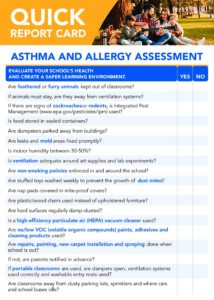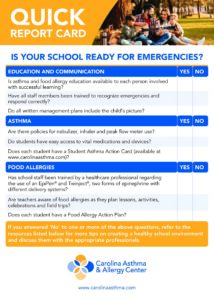
Medically reviewed by
Roopen R. Patel, MD
Carolina Asthma and Allergy Center has compiled a comprehensive back-to-school checklist to help parents, teachers, and students navigate the challenges of the school year while managing allergies and asthma.


Jump to a Checklist
Checklist for Parents:
- Inform your child’s school of any food allergies your child may have. Ensure that all staff members, including the classroom teacher, lunchroom staff, and school nurse, are aware of your child’s allergies and will help avoid those foods.
- Develop a food allergy management plan with the school. Discuss options for avoiding allergens, emergency procedures, and when to administer medication.
- Have your child’s physician complete any necessary forms, such as an emergency action plan or a medication authorization form. Provide the school with several contact numbers and a reliable email address.
- Have an emergency plan in place that outlines how to manage symptoms in the event of anaphylaxis, asthma exacerbation, or other allergy emergencies.
Checklist for Teachers
- Identify students with allergies or asthma and inform all staff members responsible for the student’s care.
- Establish a food allergy management plan with the parent or guardian. Discuss options for avoiding allergens, emergency procedures, and when to administer medication.
- Ensure that all staff members are trained in administering medication and are aware of the location of medication for each student.
- Establish a communication plan with the parent or guardian to report any incidents or concerns.
- Create an emergency plan that outlines how to manage symptoms in the event of anaphylaxis, asthma exacerbation, or other allergy emergencies.
Checklist for Students
- Inform your teacher of any food allergies or asthma.
- Carry your medication with you at all times, or ensure that it is stored in a safe and accessible location.
- Avoid sharing food or drinks with classmates.
- Wash your hands frequently.
- Inform an adult immediately if you experience any symptoms of an allergic reaction or asthma exacerbation.


Click here to download our Quick Allergy & Asthma Report Card



